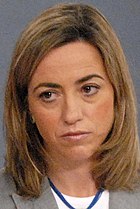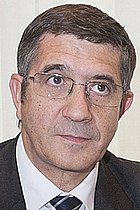
The Spanish Socialist Workers' Party is a social-democratic political party in Spain. The PSOE has been in government longer than any other political party in modern democratic Spain: from 1982 to 1996 under Felipe González, 2004 to 2011 under José Luis Rodríguez Zapatero, and since 2018 under Pedro Sánchez.
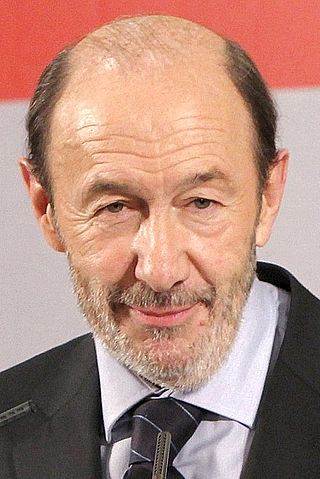
Alfredo Pérez Rubalcaba was a Spanish statesman, politician and chemist who served as Deputy Prime Minister of Spain from 2010 to 2011, and previously as Minister of Education from 1992 to 1993, as Minister of the Presidency from 1993 to 1996, as Minister of the Interior from 2006 to 2011 and as acting Minister of Defence between May and June 2008.

The Leader of the Opposition is an unofficial, mostly conventional and honorary title frequently held by the leader of the largest party in the Congress of Deputies—the lower house of the Spanish parliament, the Cortes Generales—not within the government. They are usually the person who is expected to lead that party into the next general election.

Carme Maria Chacón Piqueras was a Spanish lawyer, lecturer and politician who was minister of Defence from 2008 to 2011 in the cabinet led by Spanish Prime Minister José Luis Rodríguez Zapatero.
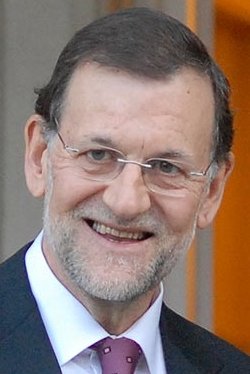
The 2011 Spanish general election was held on Sunday, 20 November 2011, to elect the 10th Cortes Generales of the Kingdom of Spain. All 350 seats in the Congress of Deputies were up for election, as well as 208 of 266 seats in the Senate. An election had not been due until April 2012 at latest, but a call by Prime Minister José Luis Rodríguez Zapatero for a snap election five months ahead of schedule was announced on 29 July 2011. Zapatero would not be seeking a third term in office, and with political pressure mounting, a deteriorating economic situation and his political project exhausted, an early election was perceived as the only way out.
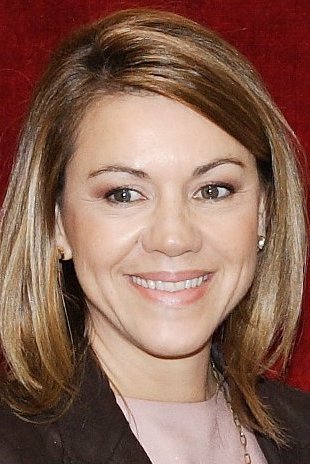
The 2011 Castilian-Manchegan regional election was held on Sunday, 22 May 2011, to elect the 8th Cortes of the autonomous community of Castilla–La Mancha. All 49 seats in the Cortes were up for election. The election was held simultaneously with regional elections in twelve other autonomous communities and local elections all throughout Spain.

The 2016 Spanish general election was held on Sunday, 26 June 2016, to elect the 12th Cortes Generales of the Kingdom of Spain. All 350 seats in the Congress of Deputies were up for election, as well as 208 of 266 seats in the Senate.

The 38th Federal Congress of the Spanish Socialist Workers' Party was held in Seville from 3 to 5 February 2012, to renovate the governing bodies of the Spanish Socialist Workers' Party (PSOE) and establish the party's main lines of action and strategy for the next leadership term. The congress was called after the PSOE suffered its worst defeat since the Spanish transition to democracy in the general election held on 20 November 2011. Previous secretary-general José Luis Rodríguez Zapatero had announced in April the same year he would not stand for election to a third term as Prime Minister of Spain, announcing his intention to step down as party leader after a successor had been elected.

The 35th Federal Congress of the Spanish Socialist Workers' Party was held in Madrid from 21 to 23 July 2000 to renovate the governing bodies of the Spanish Socialist Workers' Party (PSOE) and establish the party's main lines of action and strategy for the next leadership term. It was held after the party's defeat in the 2000 general election and the subsequent resignation of then secretary-general Joaquín Almunia.

Susana Díaz Pacheco is a Spanish politician from Andalusia and a leading figure in the Spanish Socialist Workers' Party (PSOE) as the former leader of the Andalusian PSOE-A.
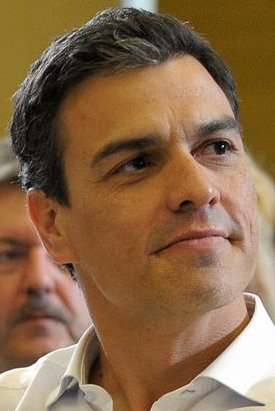
The 2016 PSOE crisis was a political conflict within the Spanish Socialist Workers' Party (PSOE), starting on 26 September 2016. Long-standing discontent with party Secretary General Pedro Sánchez and the combination of a series of circumstances resulted in a party revolt to force Sánchez's dismissal on 28 September, in an episode lasting until 1 October colloquially dubbed by some media and journalists as the "war of the roses". The ensuing power vacuum and Sánchez's replacement by an interim managing committee, coupled with the party's turn to allow a PP minority government after a 10-month deadlock on government formation and the resulting worsening of relations with its sister party in Catalonia, the PSC, triggered a crisis of a scale unprecedented in the party's 137 years of existence.

The 39th Federal Congress of the Spanish Socialist Workers' Party was held in Madrid between 16 and 18 June 2017, to elect a new party leadership in the Spanish Socialist Workers' Party (PSOE) and set out the party's main lines of action and strategy, after the sacking of Pedro Sánchez as party leader in October 2016 had resulted in a caretaker leadership being appointed. The primary election was held on 21 May 2017, after being confirmed in a federal committee on 1 April.

The 18th National Congress of the People's Party was held in Madrid from 10 to 12 February 2017, to renovate the governing bodies of the People's Party (PP) and establish the party's main lines of action and strategy for the next leadership term. The congress was initially due for 2015, but the various elections held in Spain that year and the deadlock in the government formation negotiations leading up to the 2016 general election, as well as a major crisis over the issue within the opposition Spanish Socialist Workers' Party (PSOE), saw the event being delayed until early 2017.

The 19th National Congress of the People's Party, officially the 19th Extraordinary National Congress, was held in Madrid from 20 to 21 July 2018, to renovate the governing bodies of the People's Party (PP) and establish the party's main lines of action and strategy for the next leadership term. A primary election to elect the new party president was held on 5 July. The congress was called by the party's National Board of Directors on 11 June as a consequence of former Spanish prime minister Mariano Rajoy's resignation as PP leader on 5 June, following the motion of no confidence that had voted his government down on 1 June. The leadership election was the first whereby PP members directly participate in choosing a leader for the party. On 26 June 2018, it was announced that only 66,706 PP members out of the 869,535 reported by the party had registered to vote in the election.

Magdalena Valerio Cordero, is a Spanish legal expert and politician, of the PSOE, that has spent most of her political career in the autonomous community of Castilla-La Mancha. She currently serves as president of the Council of State since 2022. Previously, she was Minister of Labour, Migrations and Social Security of the Government of Spain between 2018 and 2020, when she was succeeded by Yolanda Díaz and José Luis Escrivá.

Meritxell Batet Lamaña is a Spanish jurist, former politician, and member of the Socialists' Party of Catalonia (PSC), who served as President of the Congress of Deputies from 2019 to 2023. Prior to this, she served as Minister for Territorial Policy and Civil Service of the Government of Spain between June 2018 and May 2019.

The 17th National Congress of the People's Party was held in Seville from 17 to 19 February 2012, to renovate the governing bodies of the People's Party (PP) and establish the party's main lines of action and strategy for the next leadership term. The congress slogan was "Committed to Spain", and it saw Mariano Rajoy, incumbent prime minister of Spain as a result of the PP victory at the 2011 Spanish general election, being re-elected unopposed for a third term as party president with 97.6% of the delegate vote in the congress and 2.4% of blank ballots (63).
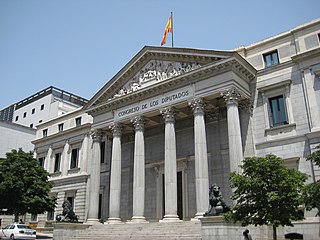
The 13th Congress of Deputies was a meeting of the Congress of Deputies, the lower house of the Spanish Cortes Generales, with the membership determined by the results of the general election held on 28 April 2019. The congress met for the first time on 21 May 2019 and was dissolved prematurely on 24 September 2019.
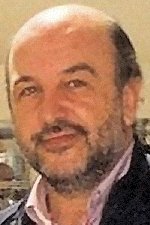
The 34th Federal Congress of the Spanish Socialist Workers' Party was held in Madrid from 20 to 22 June 1997, to renovate the governing bodies of the Spanish Socialist Workers' Party (PSOE) and establish the party's main lines of action and strategy for the next leadership term. It saw Joaquín Almunia being elected unopposed as party secretary-general, with 74.7% of the delegate vote in the congress and 25.3% of blank ballots (231), following Felipe González's surprise announce in the congress opening that he would not be seeking re-election as party leader.

The 41st Federal Congress of the Spanish Socialist Workers' Party will be held in Seville from 29 November to 1 December 2024, to renovate the governing bodies of the Spanish Socialist Workers' Party (PSOE) and establish the party's main lines of action and strategy for the next leadership term. Although the congress was scheduled to be held in 2025, party leader Pedro Sánchez had expressed his intention to advance it to late 2024, with this being confirmed on 30 August 2024. Initially planned for 15–17 November, it was delayed two weeks for "logistical reasons".










